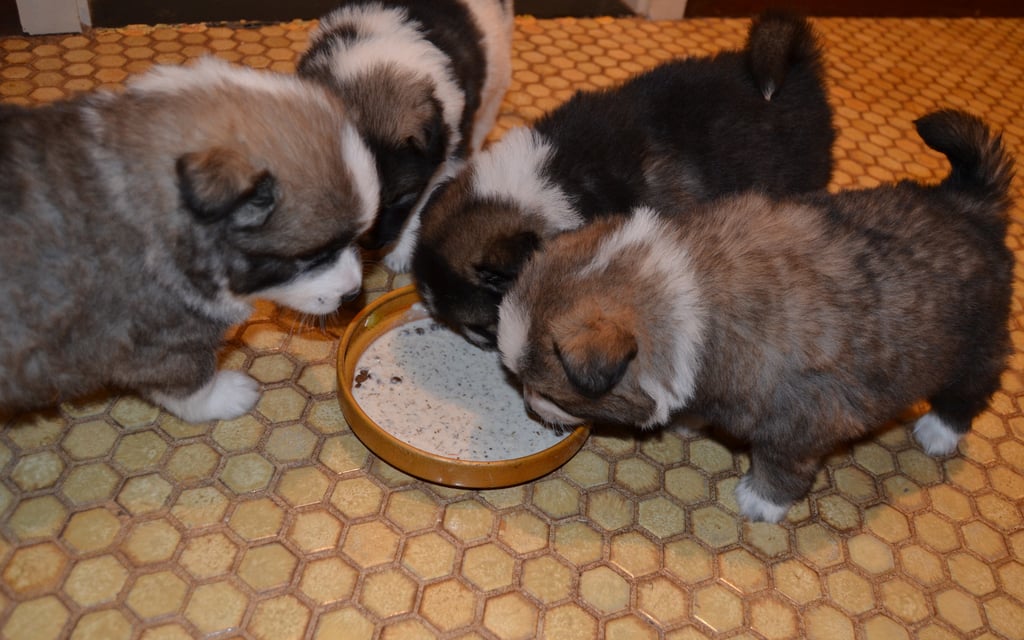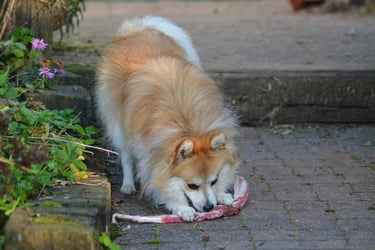Nutrition
The following information is based on our personal experience; feel free to adapt it to your habits and your dog's needs.


Feeding Frequency:
Between 8 weeks and 6 months: 3 meals per day.
Between 6 and 12 months: 2 meals per day. (At 6 months, you can start giving adult food.)
From one year onwards: 1 meal per day.
The last meal should be served no later than 5:00 PM, as digestion is less efficient in the evening.
Food Selection:
If you use kibble, it is unnecessary to soak it. However, you can add herbs and a little fish oil or vegetable oil. Domestic dogs generally do not need as much protein as their wild counterparts, such as wolves. For a puppy, aim for about 26% protein, and from 4 months old, between 22% and 24%.
We recommend thoroughly analyzing the kibble you choose, as many varieties are overcooked and may contain chemical additives. Ideally:
Protein: 22-24%
Fat: 10%
Crude fiber: 3-4%
Crude ash: 8%
Calcium: 1.3%
Phosphorus: 0.8%
If possible: no colorants, flavorings, attractants, or chemical preservatives!
Canned food is not recommended, as it can lead to excessive stomach acid production.
For homemade food:
Rice, cooked potatoes, pasta, mixed flakes.
Meat (beef, lamb, chicken), fish.
Liver, chicken hearts (only occasionally).
Carrots, apples, endive (cooked or steamed, but not raw).
Herbs (mint, lemon balm, artichoke, dandelion root, fennel, rosemary, wild garlic, nettle, Swiss chard, lemon balm).
Salmon oil, olive oil, malt sprouts, wheat germ, wheat bran.
Brewer's yeast, seaweed (also helps with heartburn).
A veal bone twice a week.
Important: Never feed raw pork due to the deadly risk of Aujeszky's disease. Pork must always be cooked. Other meats can be given raw or cooked.
Beef:
The meat we give our dogs is organic and ecological (our animals have a low methane emission because they do not receive concentrated feed). It comes from local organic farms and breeders, including our own Highland cattle and sheep; we always avoid industrial meat.
Recommended Grains:
If grains are to be given, unprocessed varieties are particularly recommended: amaranth, millet, spelt, and quinoa. Barley, oats, rye, and polenta can also be used. Wheat bran is beneficial for intestinal health, but in small doses, as it provides important fiber for digestion. For dogs with gluten intolerance, buckwheat, millet, corn, rice, amaranth, and quinoa are good alternatives, as they are all gluten-free. Other gluten-free carbohydrate-rich foods include potatoes, soy, and sesame. Grains should be soaked or ground.
Fasting for the dog:
What is the real situation? Should the dog fast or not?
Some dogs benefit from a fasting day once a week, while others do not. Fasting should only be done in the case of diarrhea or vomiting. A fasting day can be beneficial, but only if the animal suffers from vomiting or diarrhea, to avoid further irritation to the intestinal lining.
If the dog doesn't eat:
If a dog decides not to eat, it may indicate discomfort. If it resumes eating the next day, there is no need to worry. However, if the loss of appetite persists, a visit to the vet is recommended.


Follow us :
Elo® "vom Warchetal"
+3280770705
+35496114654
© 2024. All rights reserved.


